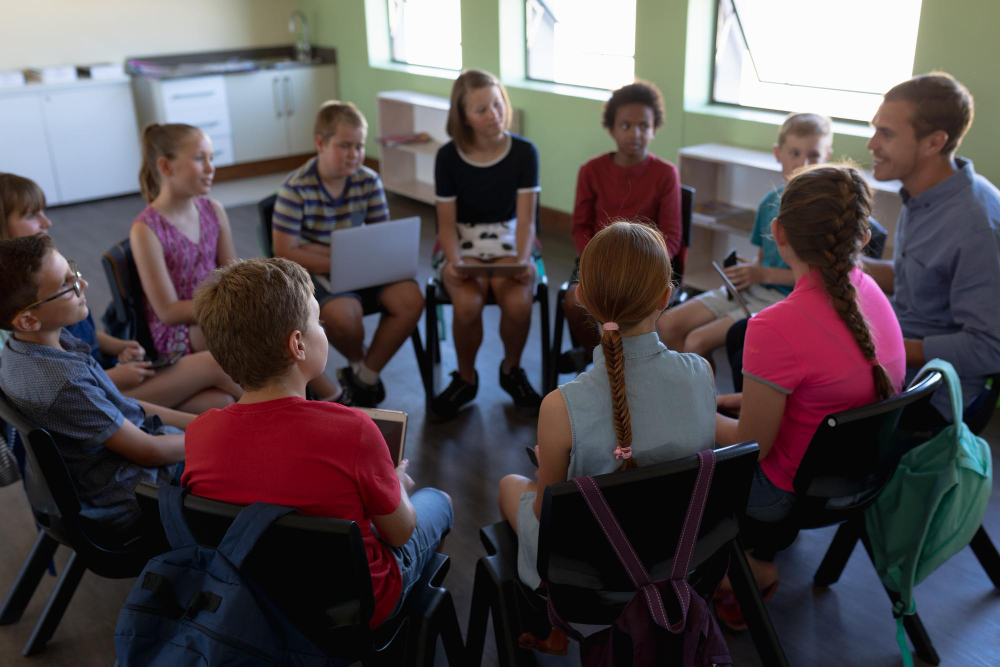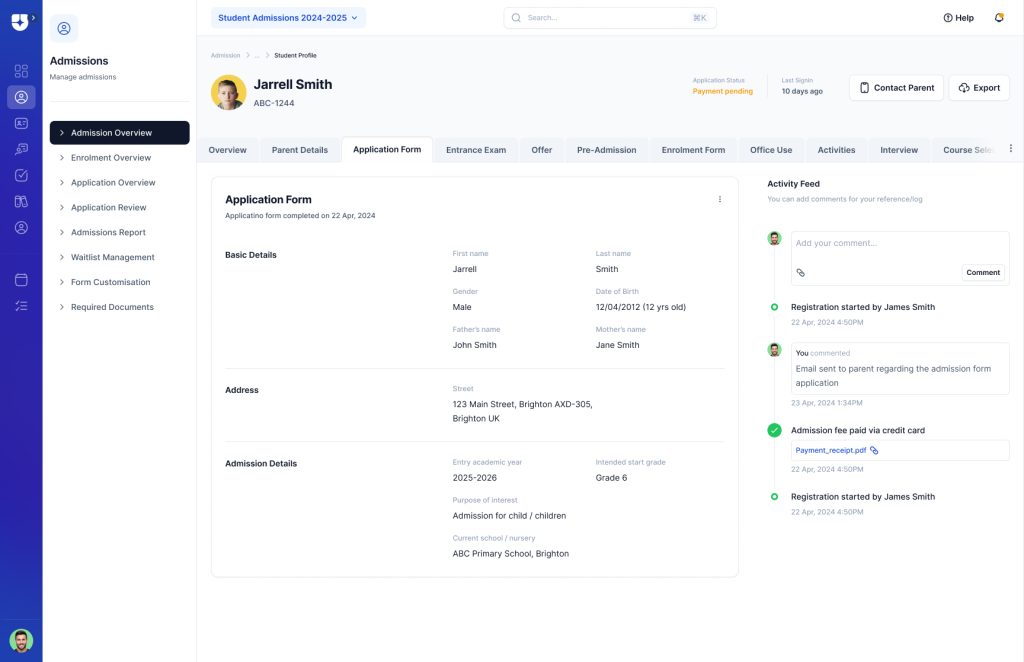Introduction
In today’s competitive job market, students have a vast range of occupation alternatives. Early career guidance for students is critical for navigating these decisions effectively. Teachers play an important part in this process by serving as mentors, advisors, and role models. Teachers have the ability to greatly affect their student’s future jobs by encouraging them to engage in career discussions, introducing them to numerous occupations, and assisting them in developing necessary skills.
Schools like Palisades Charter High School and Ekya Schools serve as shining examples of how successful integration of career guidance can profoundly impact students’ futures. Palisades Charter High School, with its Pali High Career Technical Education, and Ekya Schools, through their College and Career Guidance (CCG) program, have shown how dedicated career support can enhance educational outcomes. By implementing similar strategies, you too can guide your students towards fulfilling and successful careers. Read this blog to discover effective methods and provide your students with the essential tools they need for future guidance.
1. The position of teachers in career guidance for students
• Importance of early career guidance for students
Early career assistance enables students to make educated choices about their path. According to a study carried out by the National Career Development Association (NCDA), students who acquire career assistance during high school are 30% far more inclined to pursue further education and indicate happier employment.
• Teachers as mentors and advisors
Teachers sometimes serve as an initial source of interaction for students looking for career assistance. Aside from providing educational information, they offer emotional support and practical guidance, assisting students through the complexity of professional choices. Teachers may encourage students to choose jobs they had not previously considered by describing their personal experiences and thoughts.
• Creating a supportive environment
A friendly environment helps kids to consider different career possibilities without fear of being judged. When teachers establish a secure and accepting environment, kids feel more comfortable communicating their passions and goals. Schools that cultivate such cultures experience a significant rise in student involvement and job exploration projects.

2. Inspirational career talks and guest speakers
• How career talks can spark interest
Career talks give kids insights into various occupations, which captures their attention and curiosities. According to an Edutopia survey, 85% of students said they felt more motivated and interested in occupations after hearing career talks. Hearing personal tales from individuals about their chosen careers might inspire students to follow their ambitions.
• Benefits of exposing students to different careers
Exposing students to different occupations allows them to comprehend the many possibilities accessible. Teachers might arrange for people from various areas to discuss their work, emphasizing the obstacles and achievements. This extensive experience can help students find new passions and define their career ambitions.
• Strategies for organizing successful career talks
- 1. Identify compelling and passionate speakers.
- 2. Plan engaging sessions that include Q&A sessions.
- 3. Make talks believable by using real-life success stories.
• Experiences of inspirational guest speakers
For example, an established business person as a guest speaker can motivate students to establish their organizations. In one school, following a series of career talks, there was a significant rise in students exhibiting curiosity regarding startup activity, demonstrating the sessions’ significant influence.
3. Exploring career options: A diverse approach
• Field trips and career days
Field tours and career day events give students hands-on exposure that helps them understand their future occupations. According to a survey conducted by the National Education Association (NEA), students who attend career-discovery field trips are 25% more inclined to opt for specific occupations. Visiting companies offer students the opportunity to observe individuals in action, making conceptual professional notions seem more concrete and meaningful.

• Engaging with professionals in various fields
Interaction with individuals allows learners to raise queries and learn about various possible careers. Teachers might invite specialists into the classroom or arrange trips to their organizations. These conversations allow students to develop the structure of relations and get insight into diverse occupations.
• Encouraging exploration through reading and research
Teachers can inspire students to pursue occupations through studying and carrying out projects. Assigning projects which require them to research various occupations will assist them to have a better grasp of the abilities and knowledge required for various occupations. This strategy promotes curiosity and autonomous learning.
4. Skill development: Planning for the future
• Practical seminars on resume-building
Students benefit from resume-building seminars, which help them construct competent resumes. According to the American School Counselor Association (ASCA), students who attend these sessions are far better able to get internships and job interviews. Teachers may assist students express their abilities more clearly by assisting them throughout the resume-writing process.
• Mock interview and feedback sessions
Mock interviews offer students vital instruction and criticism. Having these lessons in a friendly setting allows students to gain assurance and enhance their interview skills. Evaluation from peers and educators can help students improve their approach.

• Emphasizing the importance of soft skills
Soft skills such as communication, teamwork, and problem-solving are crucial for professional success. Introducing these skills in school helps students get ready for employment. Teachers can use methods that encourage these abilities, such as group projects and presentations, to make sure students are holistic and prepared for what lies ahead.
5. Encourage real-world exposure
• Collaboration with local businesses for paid internships
Internships provide students with hands-on expertise and potential for networking. According to the National Education Association, students who have completed internships are considerably more likely to obtain employment following graduation. Teachers can give students the opportunity to apply their educational expertise in real-world situations by collaborating with local businesses.
• Volunteer opportunities and community projects
Volunteer opportunities and community projects provide students with valuable knowledge and expertise. The National Citizen Service reports that students who volunteer are much more likely to be satisfied with the positions they hold. Encouraging children to participate in community projects builds a sense of accountability and strengthens their resumes.

• Benefits of extracurricular involvement
Extracurricular activities offer kids the opportunity to pursue passions and build proficiency. The National Center for Education Statistics (NCES) found that children who participate in recreational activities are prone to succeed academically and professionally. Participation in organizations and sports imparts important lessons about teamwork, leadership, and resource organization.
6. Leverage technology in career exploration
• Using digital resources for career guidance for students
Online Resources and Platforms like LinkedIn, Coursera, and Khan Academy among others are excellent online tools for occupational exploration. According to a LinkedIn poll, 70% of students use online platforms to research careers and develop skills. Teachers can assist students in using these tools efficiently identifying career paths and developing appropriate skills.
• Virtual career fairs and webinars
Virtual career fairs and online seminars allow students to gain knowledge about professions from experts in the field. According to the NCDA, schools that organize virtual career fairs see significantly higher levels of student engagement compared to in-person events. These virtual events eliminate geographical obstacles, making it easier for students to explore various career options regardless of their location.

• Role of educational apps and games
Career discovery is made more enjoyable with educational applications and games. Apps such as Career Explorer and FutureFinder assist students in matching their interests with occupations by giving individualized recommendations and insights. These technologies can make the journey of choosing a career more enjoyable and participatory, retaining students interested and committed.
Conclusion
Teachers play an important role in assisting students throughout the job exploration process. Teachers could encourage students to arrive at educated career decisions by giving career talks, exposing them to various occupations, developing important skills, ensuring real-world experiences, and utilizing technologies. The data and research cited demonstrate the enormous influence of these strategies, emphasizing the necessity of early and thorough career counselling in schools.

